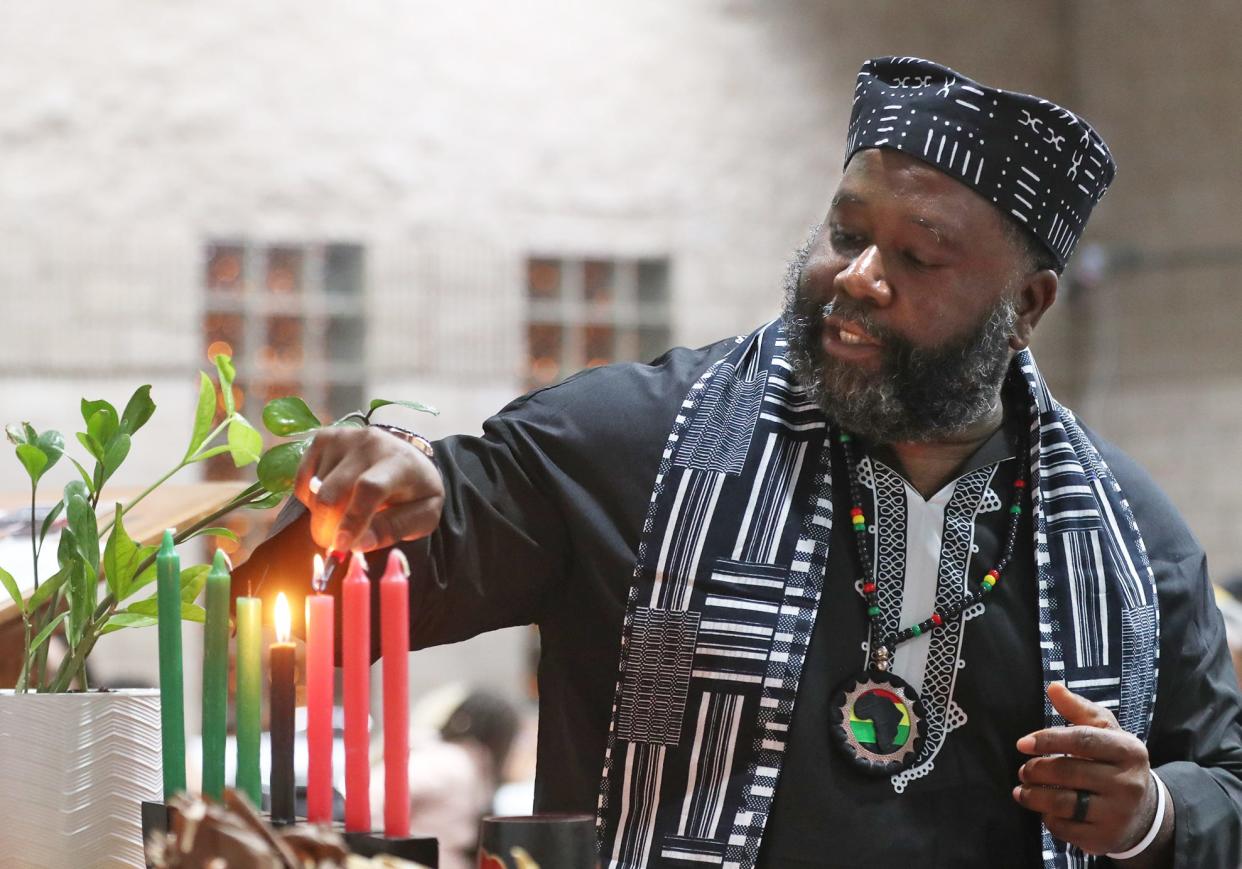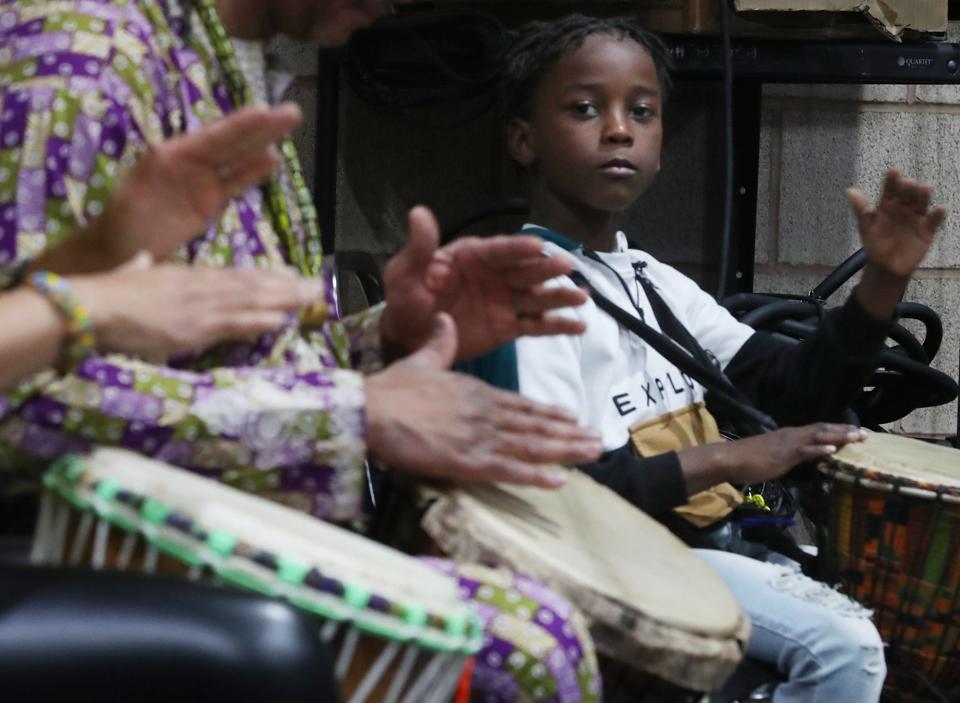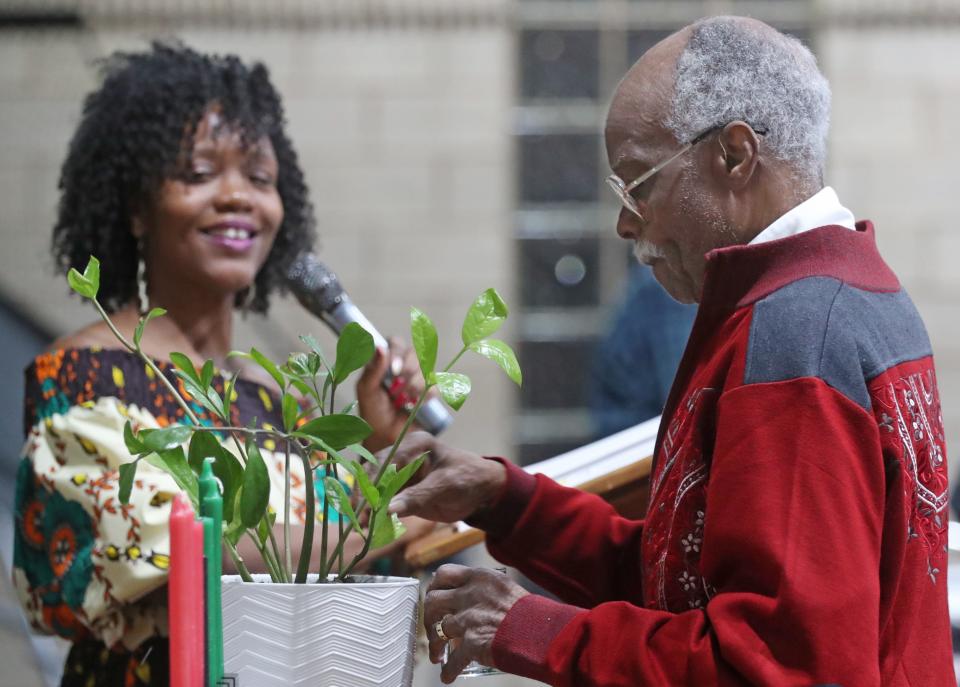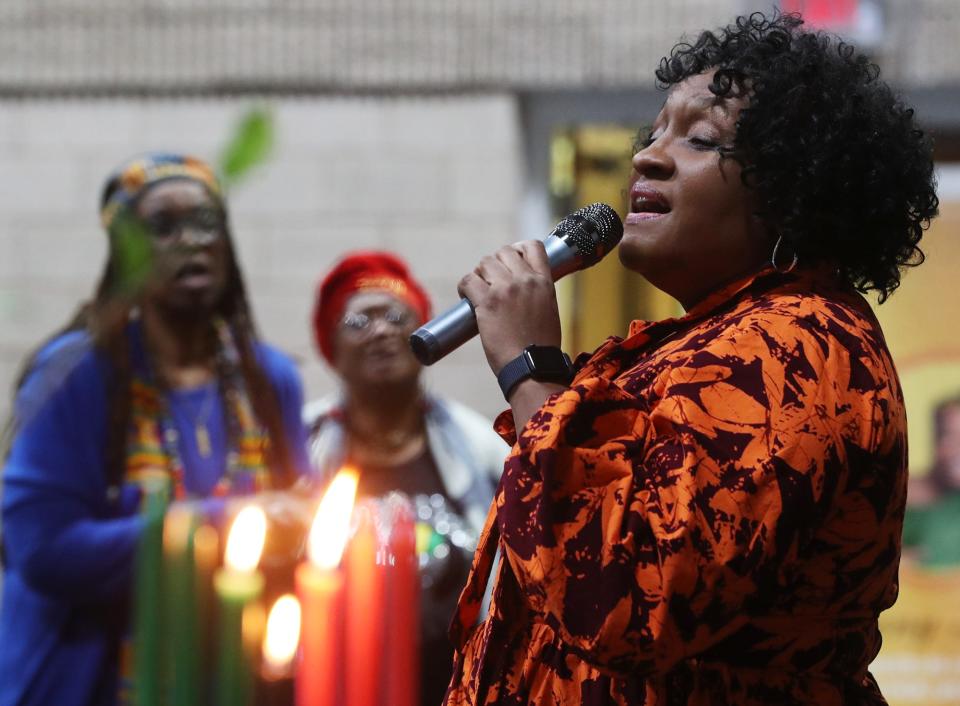Akron's Kwanzaa celebration marks season for recognizing traditional culture, values

The sound of drums filled the Gus Johnson Community Center in West Akron Thursday as about 100 people gathered to recognize the importance of collective work and responsibility, or Ujima, the third principle of Kwanzaa.
At one point during the event — one of seven scheduled between Dec. 26 and Jan. 1 as a celebration of family, community, culture and the seven principles of Kwanzaa — participants stood to offer proverbs highlighting those values.
"We can’t teach what we don’t know, and we can’t lead where we can’t go," said one.

The Akron Kwanzaa Ujima Celebration, hosted by Akron's Project Ujima, focused on work done to bring the community together. Two long-time members of the organization were recognized with the Crystal L. Jones Collective Work & Responsibility Award, named after one of the organization's co-founders.
Sondra "Esi" Bryant was honored for her work in helping children learn to read. Terrence "Kwabena" Shelton was honored for his work with discussion circles, where community members meet to iron out issues and come to a consensus on solutions.
"I just serve," Bryant said. "I'm committed to the mission of the community and the definition of collective work and responsibility."
She said her recent volunteer work focuses on improving literacy in the community by featuring books by African American authors to help young people "learn who they are and establish a sense of pride."
Like Bryant, Shelton has worked with Project Ujima since its inception in 2011.
"I've been doing circle work for years under various types of circumstances with deliberative dialogues, peace circles, mythological drumming circles," he said, adding he's tried to focus on making change in the community.
2020: Akron's Kwanzaa celebration caps year of extraordinary challenges
Project Ujima Executive Director LaKesh Hayes called the principles of Kwanzaa "a way of life for the African people in African community."

"The seven principles actually surround you − it's not just the last seven days of the year that we should be thinking about how we use those principles in our everyday lives to guide us and our family relationships, or friend relationships and our work relationships and our community," she said.
The seven principles, or “Nguzo Saba," include unity, self-determination, collective work and responsibility, cooperative economics, purpose, creativity and faith.
Origins of Kwanzaa
According to the National Museum of African American History & Culture, California State University professor and activist Maulana Karenga created Kwanzaa in 1966 for four reasons:
To reaffirm and restore African heritage and culture;
To introduce and reinforce the "Nguzo Saba," or seven principles;
To serve as a nationally celebrated communal and non-heroic holiday; and
As an act of cultural self-determination.
Karenga based the holiday on African harvest festivals, with the East African language Swahili used to highlight principles shared across the continent and among people in the diaspora caused by the slave trade.
Debra Calhoun, co-chair of the Akron African American Cultural Association, said Kwanzaa has lessons for all cultures.
"Whether it's the values system, whether it's the idea of being responsible for oneself and making that responsibility at a larger level, it's things that everybody, every culture, every immigrant, if you will, has .... This is how we're going to move and groove if we're going to do what we need to do here," Calhoun said. "We have to work as a unit, and that unit starts as an individual as well as a larger level."
She also noted that an increasing number of families today are multi-cultural.
Likewise, John Fuller, the other co-chair of the Akron African American Cultural Association, said the Kwanzaa celebration can be seen as a celebration of culture as relevant as an Irish or Italian festival.
More: From homeless to head of class
A local celebration of global values
Thursday's celebration included the seating of elders, including respected members of the community such as Ohio State Sen. Vernon Sykes and Summit County Council District 5 Rep. Veronica Sims.

The crowd also joined in singing what is known as the Black national anthem, a hymn written as a poem titled "Lift Every Voice and Sing." It was composed by NAACP leader James Weldon Johnson in 1900 to commemorate President Abraham Lincoln's birthday and was prominently used as a rallying cry during the Civil Rights Movement of the 1950s and 1960s.
Lathardus Goggins II, co-chair of the Akron NAACP chapter's Kwanzaa Planning Committee, said Kwanzaa is meant to bring African culture back to people who for centuries were prohibited by law from expressing their own culture.
Goggins hosted Friday's celebration, Ujamaa − or cooperative economics − in conjunction with the Akron chapter of the Urban League at the Bounce Innovation Hub.
Friday's celebration featured Black entrepreneurs, with the goal of encouraging the Black community to support local businesses and keep money circulating within the community.
In decades past, the celebration of Kwanzaa in Akron was hosted by homeowners who often had standing-room only crowds as the week-long celebration moved from house to house.
Eventually, they encouraged organizations to sponsor and host the events, which resulted in even larger audiences.
The week's celebration began Tuesday with a celebration of unity (Umoja), hosted and sponsored by the Alpha Phi Alpha fraternity. Wednesday's event recognized self-determination (Kujichagulia), hosted and sponsored by Mount Calvary Baptist Church.
Following the Thursday and Friday events celebrating Ujima and Ujamaa, the 6 p.m. event Saturday will recognize purpose (Nia) at the 8 Point Bistro, 1912 Buchholzer Blvd., sponsored by Guys and Gals Inc.
Sunday's celebration will mark creativity (Kuumba) at 4 p.m. at the Unitarian Universalist Church, 3300 Morewood Road. It is sponsored by the Greater Akron-Canton Chapter of the National Association of Black Social Workers.
The final day is Monday, celebrating faith (Imani), which will be a Zoom meeting hosted by the Kanuni Tribe, an organization devoted to providing community cultural events and education with a focus on African heritage. The meeting ID is 814 7931 9812, or dial 1-646-931-3860. Those interested in attending can also contact Kwa Hill at 330-322-9630.
Eric Marotta can be reached at emarotta@gannett.com
This article originally appeared on Akron Beacon Journal: Akron organizations join forces to celebrate Kwanzaa, African culture

